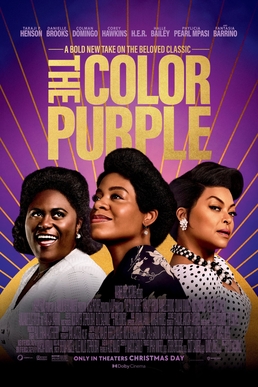
A woman faces many hardships in her life, but ultimately finds extraordinary strength and hope in the unbreakable bonds of sisterhood.
‘The Color Purple’ is a new movie version of Alice Walker’s classic 1982 novel, the second time it has been adapted for screen after Steven Spielberg’s 1985 effort. This version from Blitz Bazawule is a musical (based off a stage musical), which is an odd choice for this material and while accepting it must work for some people given its success on stage, it certainly didn’t work for me. Worth noting I haven’t seen Spielberg’s version, nor read the book, so this was my first introduction to this story.
The story follows Celie (Fantasia Barrino in her movie debut), a young African-American woman living in the Deep South in the early 1900s. She has a tough upbringing with her mother passing many years earlier and a father who physically and sexually abuses her, with her only confidante her sister Nettie (H.E.R.). She is soon married off to a local farmer known as ‘Mister’ (Colman Domingo), who is just as abusive as her father and Celie is stuck in a situation with no feasible way out, made worse by her sister being exiled by both her father and Mister, leaving her all alone. The movie follows Celie’s life and the people she comes across, with Taraji P. Henson’s jazz singer Shug Avery and Danielle Brooks’ Sofia the most prominent. Both of them are strong, opinionated black women who will not stand for abusive husbands, and their attitudes teach Celie how to stand up for herself.
Firstly as a musical I don’t think this works. Besides the obvious point that the material isn’t a natural fit for this format, the songs are forgettable, at best pleasant gospel choir tunes but you expect a musical to provide something more memorable than background music. Secondly, the story itself never gripped me and I think that was less to do with the underlying story itself, and more to do with how the movie was directed and pulled together. I found it quite pandering and cloying, and I didn’t like how the movie is willing to forgive the awful behaviour of some characters in order to allow the film a happy, wholesome ending. The performances are fine, Colman Domingo and Danielle Brooks are really good in particular, but having watched a lot of the Oscar nominees lately I don’t think any are Oscar worthy.
At this time of year you get a lot of movies coming out with their eyes on getting award nominations and prizes, some of which are deserving and some less so. For me, ‘The Color Purple’ is Oscar bait in its purest form, engineered to tick the boxes that the Academy often looks for in movies. In some respects, having seen the brilliant ‘American Fiction’ the day prior, it could be taken as the type of media that ‘American Fiction’ is satirising to a degree. From a production perspective it falls down as well, particularly in how it handles the transition of time with its characters, inconsistently changing the actors/actresses who play some characters, while not bothering at all to apply ageing make up to others despite the story spanning 25 years – Taraji P. Henson in particular looks the exact same throughout. It is a little lazy – as if the inbuilt affection for the source material would be enough on its own.
As you have probably gathered, I really didn’t like this movie. To add to the above, it is also far too long, and I think the various missteps it takes take away from the stronger elements such as Celie’s overall journey that covers many aspects of what life would have been like for a black women during this time period in the American South. ‘The Color Purple‘ is my first disappointment of the year – will be intrigued to see how Spielberg’s version compares when I watch that for the podcast.
Rating: 2/5
Directed By: Blitz Bazawule
Starring: Fantasia Barrino, Taraji P. Henson, Danielle Brooks, Colman Domingo, Corey Hawkins, H.E.R., Halle Bailey, Aunjanue Ellis-Taylor, Jon Batiste and Louis Gossett Jr.
